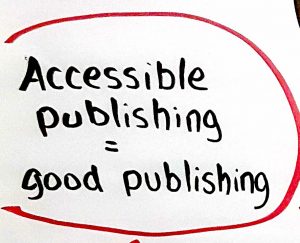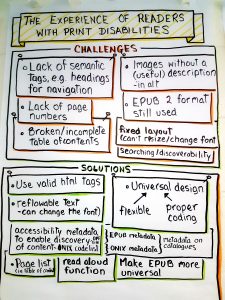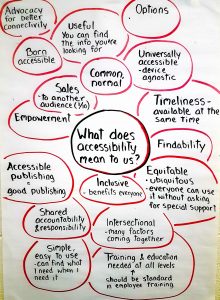The Business of Accessibility: Content that is More Usable is More Valuable
This article has been re-posted with the kind permission of the author, Abbie Headon and Bookmachine
I have to finally accept that it’s too late to say ‘Happy New Year’, but we’re right on time to say ‘Happy new Unplugged series!’ The 2019 series of BookMachine Unplugged events kicked off on Wednesday 20 February at a new venue, The Century Club, with a focus on the theme of accessibility. BookMachine Editorial Board member Ken Jones, our Production specialist, and his panel Huw Alexander, Stacy Rowe and Alicia Wise provided important insights into why accessibility matters and what we need to be doing about it.
Are You an Accessibility A11y?
Ken started by setting accessibility in context: between 10% and 20% of the world’s population live with some form of disability; 36 million people are registered blind worldwide; and 217 million people live with some form of visual impairment. But the audience requiring accessible content is even larger than this, when you take into account mobility issues, dyslexia and attentional disorders, to give just a few examples.
The concept of accessibility is not a new one: Braille was developed in the 1820s, the RNIB was founded in 1868, and the Universal Declaration of Human Rights explicitly included people with disabilities 70 years ago. So, while it may be tempting to think of accessibility as a modern phenomenon, it really isn’t – and therefore we have even less excuse for not having it at the heart of our publishing. And it was sobering to hear from Ken that currently less than 8% of the world’s books ever make it into accessible formats.
But we’re not on our own if we want to start improving our publishing practices. As well as experts like this event’s panel, there are countless people out there on the internet who are ready to help. A Twitter search for #a11y and #eprdctn will open up a world of helpful discussion around the topics of accessibility and ebook production. (And if you’re wondering what ‘a11y’ means, it’s the word ‘accessibility’ with the 11 middle letters swapped for ‘11’.)
A Library Full of Blank Pages
Stacy Rowe (Reader Services Product Manager, RNIB Bookshare) asked us to think about what it means when content isn’t accessible. Imagine walking into a fantastic library, with shelves stretching for miles. You search until you find the book you want – but when you open it, you discover all the pages are blank. That’s what life is like when content is not accessible to you. And perhaps the pages you aren’t able to read contain the very information you need for your education and your future career: without this information, you won’t be able to start off your life on the right track.
If we stop to think about it, there’s no need for the world’s publishing to be divided into ‘normal’ and ‘accessible’ content. If all content is structured in an accessible way, then everyone can use it. An accessible book is one that can be read using text-to-speech, enlargeable text and text-to-braille conversion – this is what we need to be aiming for. As long as our content is set up in the right way, it’s ready for apps and other accessibility devices to transform it into a medium that’s right for each user.
As an example, Stacy demonstrated for us how an ebook can be read super-fast using text-to-speech app VoiceOver and transformed into Braille by an Orbit Reader device. Thanks to this technology, readers can access Braille content through a handy device small enough to fit in a coat pocket, instead of needing a five-foot-tall mountain of Braille printouts. This demonstration underlined the fact that, as publishers, we don’t have to reinvent the wheel to make our books accessible: all we have to do is present our content in a well-structured way that people can use in the way they need to.
Some of Us Need the Stick
There are lots of positive reasons for us to provide accessible content: we know it’s good to spread our books to as many readers as possible; it can give us an advantage over our competitors, and it can boost out corporate social responsibility profile. But it’s not all about the carrots: some of us respond better to the stick, and there are plenty of legal sticks out there that we need to be aware of. Alicia Wise (Director, Information Power and Founding Member, ABC) explained that the two key types of laws that affect us on issues of accessibility concern copyright and equality.
The international copyright regime is monitored by the World Intellectual Property Organization (WIPO). The Marrakesh Treaty, administered by WIPO, enshrines the right of people with disabilities to make accessible copies without reference to copyright restrictions. Recent signatories to this treaty include the EU and USA – so its terms apply to us. We’re also obliged to follow the legislation of our own countries, such as the UK Equality Act 2010, which protects people from discrimination based on nine protected characteristics, one of which is disability.
It’s vital that we’re aware of these laws, because the stick of legal action is real. Domino’s Pizza was recently sued in the UK for having a non-accessible ordering app, and other organisations have been held to account for accessibility failures too. If you’re presenting the case for accessible publishing to your senior management team, the potential for damaging legal action is a motivating factor they are sure to take seriously.
Do you have to be perfect straight away? No. If you’re honest, and signal your awareness of accessibility as an important issue, your willingness to engage with it and your desire for help, people will support you. So we shouldn’t be intimidated by the work involved – we just need to get started. Alicia pointed us to the free online accessibility checker, Ace by DAISY, and there are lots of people who are ready to help us live a stick-free future.
A Picture Painted in Words
Huw Alexander (COO and co-founder, textBOX) gave us a tour of one of the thorniest accessibility issues faced by publishers: how to deal with images. Publishers who have embraced the modern EPUB3 standard are able to deal with almost all aspects of accessibility, but describing images in a way that works for all users remains a tricky issue. And if you imagine using a textbook where all the images, graphs and infographics are blank or missing, you can see just how limited your access to the book’s information would become.
Huw gave us some examples of the power of good image descriptions. A key factor is appropriateness: if a book has a picture of a painting simply to illustrate the concept of ‘paintings’, then the description can be very brief. But if, on the other hand, an in-depth book on art contains a reproduction of an artwork, then the description needs to be much more thorough. Looking at The Arnolfini Portrait, a detailed description would mention not only the couple standing at the centre of the work but also other key elements, such as the oranges in the foreground, signifying the couple’s wealth, and the fact that the only character in the painting who makes eye contact with the viewer is the couple’s dog. The level of information required depends on the context the image appears in.
Adding image descriptions improves the user experience, and accessibility is a central plank of that user experience. Making your content accessible to more people makes your books better, leading to better sales as well as helping you fulfil your goal of sharing information – which is why we’re all in this business, surely.
The Time to Start is Now
Overall, our first Unplugged panel of 2019 showed that there are a host of reasons to start producing accessible content: knowing we’re doing the right thing; reaching more readers; having a marketing and sales advantage; future-proofing our content by making it machine-readable; and protecting ourselves from legal action. And there are lots of people out there who can help us get started. So really, we have no excuse: it’s 2019 and it’s time to make our content accessible to everyone.
ASPIRE Awards
The evening ended with the presentation of the ASPIRE Awards by Alistair McNaught, Subject Specialist (Accessibility and Inclusion) at Jisc. The awards were as follows:
Awards for Publishers:
Winner: Palgrave Macmillan
Highly commended: Red Globe Press; Policy Press
Sponsored by VitalSource
Awards for Platform Providers:
Winner: EBSCO
Highly commended: Kortext; VitalSource
Sponsored by textBOX
Abbie Headon is Commissioning Editor at Prelude Books, and also writes and edits books as Abbie Headon Publishing Services. She is a 2018 Bookseller Rising Star and sits on the BookMachine Editorial Board.






